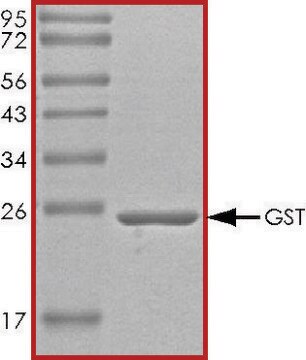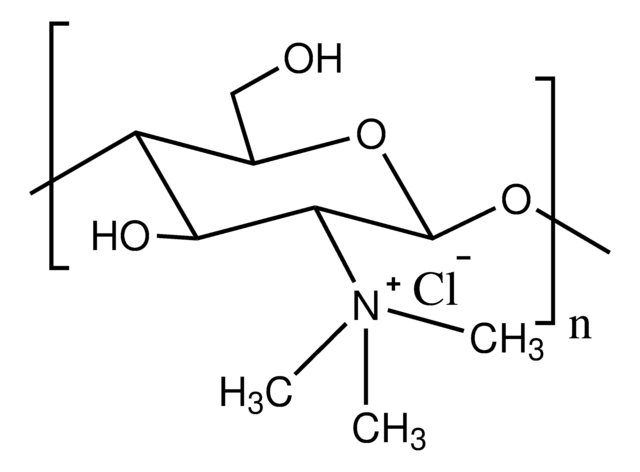GS64
GST A4-4, Recombinant Human
Sinónimos:
GTA4, glutathione S-transferase alpha 4
Iniciar sesiónpara Ver la Fijación de precios por contrato y de la organización
About This Item
Código UNSPSC:
12352200
NACRES:
NA.26
Productos recomendados
origen biológico
human
Nivel de calidad
recombinante
expressed in E. coli
Ensayo
>95% (SDS-PAGE)
Formulario
frozen liquid
actividad específica
3.68 units/mg protein
mol peso
25 kDa
concentración
1.01 mg/mL
temp. de almacenamiento
−70°C
Información sobre el gen
human ... GSTA4(2941)
Descripción general
using spectrophotometric determination of 1-chloro-2,4-dinitrobenzene (CDNB) conjugation with reduced glutathione (1 mM) in 100 mM NaPO4 (pH 6.5) at room temperature.
Acciones bioquímicas o fisiológicas
Glutathione S-transferase alpha 4 (GSTA4) is an enzyme that in humans is encoded by the GSTA4 gene. Glutathione S-transferases (GSTs) are a family of enzymes that play an important role in detoxification by catalyzing the conjugation of many hydrophobic and electrophilic compounds with reduced glutathione. Based on their biochemical, immunologic, and structural properties, cytosolic and membrane-bound forms of glutathione S-transferase are encoded by two distinct supergene families. At present, eight distinct classes of the soluble cytoplasmic mammalian glutathione S-transferases have been identified: alpha, kappa, mu, omega, pi, sigma, theta and zeta. The GSTs are thought to function in xenobiotic metabolism and play a role in susceptibility to cancer, and other diseases.
This gene encodes a glutathione S-tranferase belonging to the alpha class. The alpha class genes, which are located in a cluster on chromosome 6, are highly related and encode enzymes with glutathione peroxidase activity that function in the detoxification of lipid peroxidation products. Reactive electrophiles produced by oxidative metabolism have been linked to a number of degenerative diseases including Parkinson′s disease, Alzheimer′s disease, cataract formation, and atherosclerosis.
Almacenamiento y estabilidad
The enzyme should be used by the end-user customer within 1 year of receipt.
Código de clase de almacenamiento
10 - Combustible liquids
Clase de riesgo para el agua (WGK)
WGK 1
Punto de inflamabilidad (°F)
Not applicable
Punto de inflamabilidad (°C)
Not applicable
Elija entre una de las versiones más recientes:
Certificados de análisis (COA)
Lot/Batch Number
¿No ve la versión correcta?
Si necesita una versión concreta, puede buscar un certificado específico por el número de lote.
¿Ya tiene este producto?
Encuentre la documentación para los productos que ha comprado recientemente en la Biblioteca de documentos.
Yongzhen Yang et al.
Toxicology and applied pharmacology, 230(2), 187-196 (2008-05-20)
Our recent work in endothelial cells and human atherosclerotic plaque showed that overexpression of glutathione-S-tranferases (GSTs) in endothelium protects against oxidative damage from aldehydes such as 4-HNE. Nuclear factor (NF)-kappaB plays a crucial role during inflammation and immune responses by
Larissa M Balogh et al.
Biochemistry, 49(7), 1541-1548 (2010-01-21)
Conjugation to glutathione (GSH) by glutathione transferase A4-4 (GSTA4-4) is a major route of elimination for the lipid peroxidation product 4-hydroxynonenal (HNE), a toxic compound that contributes to numerous diseases. Both enantiomers of HNE are presumed to be toxic, and
Fabio Coppedè et al.
Mutation research, 579(1-2), 107-114 (2005-08-02)
Several lines of evidence, including an increased level of lipid peroxidation and the depletion of antioxidant molecules like as glutathione (GSH), indicate that oxidative stress plays an important role in the pathogenesis of several neurodegenerative disorders, such as Parkinson's disease
Ji Qian et al.
Molecular carcinogenesis, 48(3), 253-259 (2008-09-04)
GST Alpha 4 (GSTA4) has an important role in the protection against oxidative stress induced by carcinogens such as tobacco smoke. However, few studies investigated the association between GSTA4 polymorphisms and lung cancer risk. We genotyped three selected GSTA4 SNPs
Kaname Uno et al.
Molecular carcinogenesis, 50(10), 781-790 (2011-07-14)
Oxidative stress might participate in the carcinogenesis of human esophageal squamous cell carcinomas (hESCC). 4-Hydroxynonenal (HNE) is a major product of membrane lipid peroxidation with short life. It might act as an important mediator through the generation of adducts and
Nuestro equipo de científicos tiene experiencia en todas las áreas de investigación: Ciencias de la vida, Ciencia de los materiales, Síntesis química, Cromatografía, Analítica y muchas otras.
Póngase en contacto con el Servicio técnico







